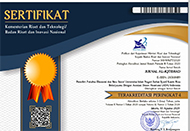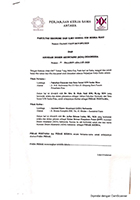ANALISIS PENGARUH PLANNED BEHAVIORAL LIP CREAM KOSMETIK WARDAH TERHADAP PURCHASE INTENTION DAN CONSUMER BUYING BEHAVIOR SECARA ONLINE PADA MAHASISWA UNIVERSITAS ISLAM RIAU
Abstract
Keywords
Full Text:
PDF (Bahasa Indonesia)References
Abd Rahman, A., Asrarhaghighi, E., & Ab Rahman, S. (2015). Consumers and halal cosmetic products: Knowledge, religiosity, attitude and intention. Journal of Islamic Marketing, 6(1), 148–163. https://doi.org/10.1108/JIMA-09-2013-0068
Ajzen, I., & Fishbein, M. (1980). Understanding attitudes and predicting social behavior.
Ajzen, I. (1985). From intentions to actions: A theory of planned behavior. In J. Kuhl & J. Beckman (Eds.), Action-control: From cognition to behavior (11–39). Germany, Springer Berlin Heidelberg.
Ajzen, I. and Fishbein, M. (1985), “The prediction of behavior from attitudinal and normative variables”, Journal of Experimental Social Psychology, Vol. 6, pp. 466-88.
Ajzen, I. (1991). Theory of planned behavior. Organizational behavior and human decision processes. 50(2)
Ajzen, I. (2005). Attitude, Personality, and Behavior second edition. Open University Press: USA.
Azmi, Aziz (2010). The Perception to Choose Halal Cosmetics Products: An Empirical Study for Malaysian Consumer. 6th International Conference on Business and Economics.
Blackwell, R.D., Paul, W.M. and James, F.E. (2006), “Attributes of attitudes”, Consumer Behavior,Thomson Press, New York, NY, pp. 235-43.
Determinants of Halal Purchase Intention: Case in Perlis. (2014). International Journal of Business and Social Research, 4(5), 118–123. https://doi.org/10.18533/ijbsr.v4i5.495
Dodds, W. B., Monroe, K. B., & Grewal, D. (1991). Effects of Price, Brand, and Store Information on Buyers’ Product Evaluations. Journal of Marketing Research, 28(3), 307. https://doi.org/10.2307/3172866
Khalek, A. A., & Ismail, S. H. S. (2015). Why Are We Eating Halal – Using the Theory of Planned Behavior in Predicting Halal Food Consumption among Generation Y in Malaysia. International Journal of Social Science and Humanity, 5(7), 608–612. https://doi.org/10.7763/ijssh.2015.v5.526
Lada, S., Harvey Tanakinjal, G., & Amin, H. (2009). Predicting intention to choose halal products using theory of reasoned action. International Journal of Islamic and Middle Eastern Finance and Management, 2(1), 66–76. https://doi.org/10.1108/17538390910946276
Norafni, F. binti R., Shafii, Z., & Shahwan, S. (2015). Awareness and Perception of Muslim Consumers on Halal Cosmetics and Personal Care Products. International Journal of Business, Economics and Management, 2(1), 1–14. https://doi.org/10.18488/journal.62/2015.2.1/62.1.1.14
Nursalwani, M., Latiff Zulariff, A., Kelantan, M., & Senior Lecturer, M. (2017). The Effect of Attitude, Subjective Norm and Perceived Behaviour Control Towards Intention of Muslim Youth at Public Universities in Kelantan to Consume Halal Labelled Chocolate Bar Product. Canadian Social Science, 13(2), 43–48. https://doi.org/10.3968/9278
Shah Alam, S., & Mohamed Sayuti, N. (2011). Applying the Theory of Planned Behavior (TPB) in halal food purchasing. International Journal of Commerce and Management, 21(1), 8–20. https://doi.org/10.1108/10569211111111676
DOI: http://dx.doi.org/10.24014/jiq.v17i1.12767
Refbacks
- There are currently no refbacks.














